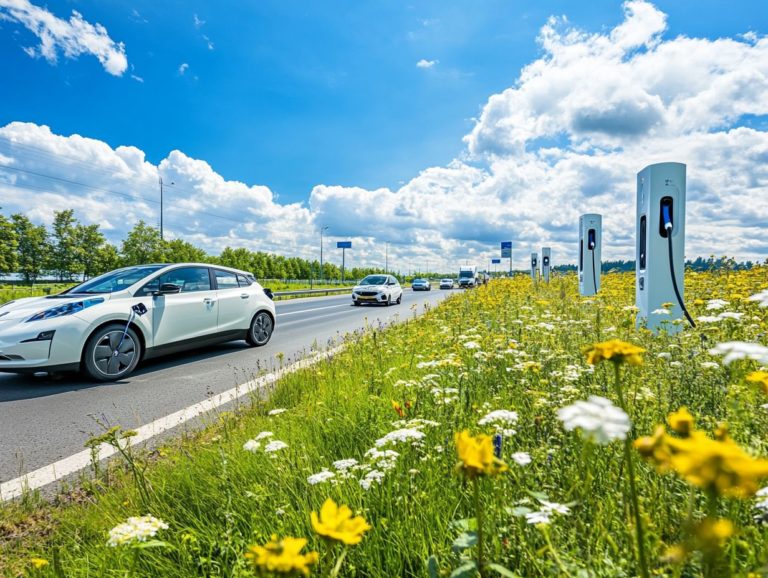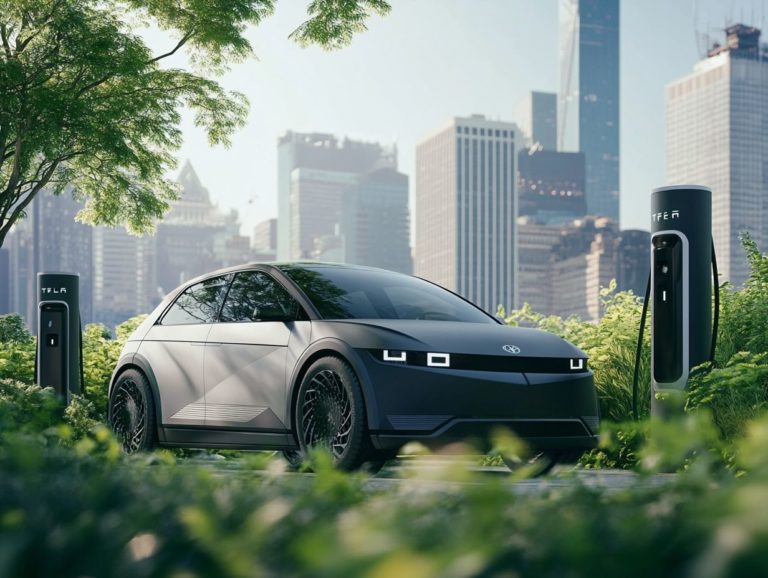The Role of Electric Vehicles in Climate Change
Climate change stands as one of the most urgent challenges of our era, influenced by a multitude of factors, including traditional transportation methods. As you delve into the causes and effects of climate change, it becomes increasingly evident that transitioning to sustainable transportation is not just beneficial but essential.
This article explores the environmental impact of conventional vehicles, highlights the advantages of electric vehicles, and addresses the obstacles hindering their widespread adoption. It also examines government incentives designed to facilitate this critical shift. Getting involved in this issue is crucial for a sustainable future!
Contents
- Key Takeaways:
- Understanding Climate Change and Its Impact
- The Need for Sustainable Transportation
- Benefits of Electric Vehicles
- Barriers to Adoption of Electric Vehicles
- Challenges and Solutions
- Government Incentives and Policies
- Encouraging the Shift to Electric Vehicles
- Frequently Asked Questions
- What are electric vehicles and how do they contribute to climate change?
- How do electric vehicles help reduce air pollution?
- What is the impact of electric vehicles on the environment?
- Are electric vehicles better for the economy?
- What are the challenges facing the widespread adoption of electric vehicles?
- How can individuals contribute to the transition to electric vehicles?
Key Takeaways:
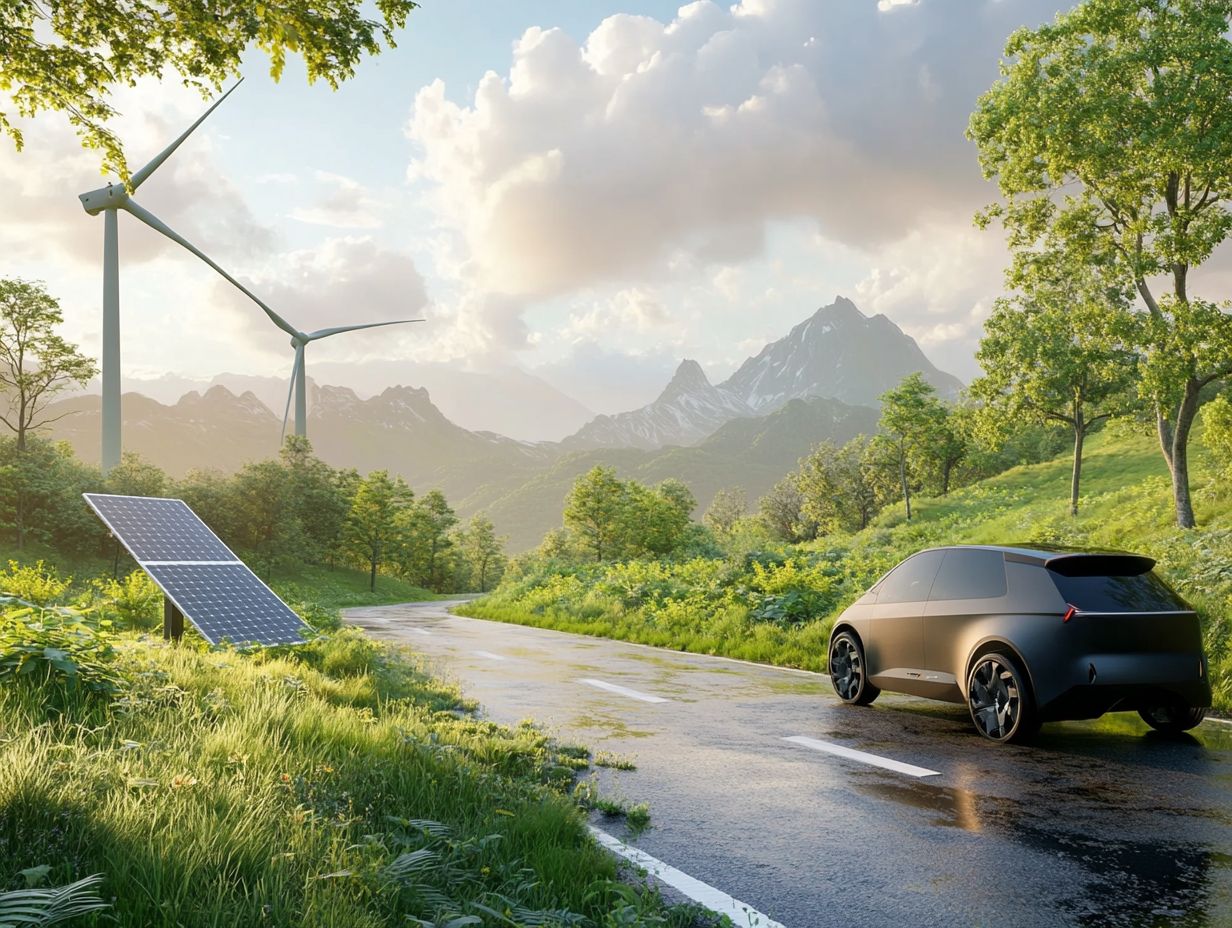
- Electric vehicles play a crucial role in mitigating climate change by reducing greenhouse gas emissions.
- The use of traditional vehicles is a major contributor to climate change, making the shift to electric vehicles a necessary step towards a more sustainable future.
- While challenges exist for the widespread adoption of electric vehicles, government incentives and policies can help accelerate the transition and reap the environmental and economic benefits.
Understanding Climate Change and Its Impact
Climate change is a critical global challenge, stemming from the accumulation of gases that trap heat in the atmosphere. This phenomenon is largely fueled by human activities such as burning fossil fuels, deforestation, and industrial manufacturing.
The consequences are far-reaching and significantly affect air quality and the natural environment. The U.S. Environmental Protection Agency has underscored the pressing necessity to tackle carbon pollution, aligning with international agreements like the Paris Agreement, which aims to limit global warming and mitigate its impacts on our planet.
Getting involved in this issue is crucial for a sustainable future!
Causes and Effects
The causes of climate change can be traced back to increasing greenhouse gas emissions, primarily driven by human activities such as burning fossil fuels for energy and transportation. This has drastic effects on both air quality and the climate system.
Along with these major contributors, industrial processes release a variety of pollutants that further exacerbate greenhouse gas concentrations. Deforestation plays a crucial role here, as the removal of trees not only eliminates essential carbon sinks (natural systems that absorb carbon dioxide) but also disrupts local ecosystems, putting biodiversity at risk.
These interconnected factors lead to a range of alarming consequences that include rising global temperatures, altered weather patterns, and a higher frequency of extreme events like hurricanes and droughts. Poor air quality directly harms human health, resulting in respiratory diseases and heat-related illnesses, revealing the complex web of interactions that highlight the necessity of addressing climate change comprehensively.
The Need for Sustainable Transportation
As climate change continues to accelerate, we must urgently adopt sustainable transportation solutions. Embracing electric vehicles (EVs) presents a compelling opportunity for you to play a crucial role in reducing emissions within the transportation sector.
By making this transition, you not only contribute to global emissions reduction efforts but also champion a cleaner, more sustainable future. Join the movement towards electric vehicles today!
Impact of Traditional Vehicles on Climate Change
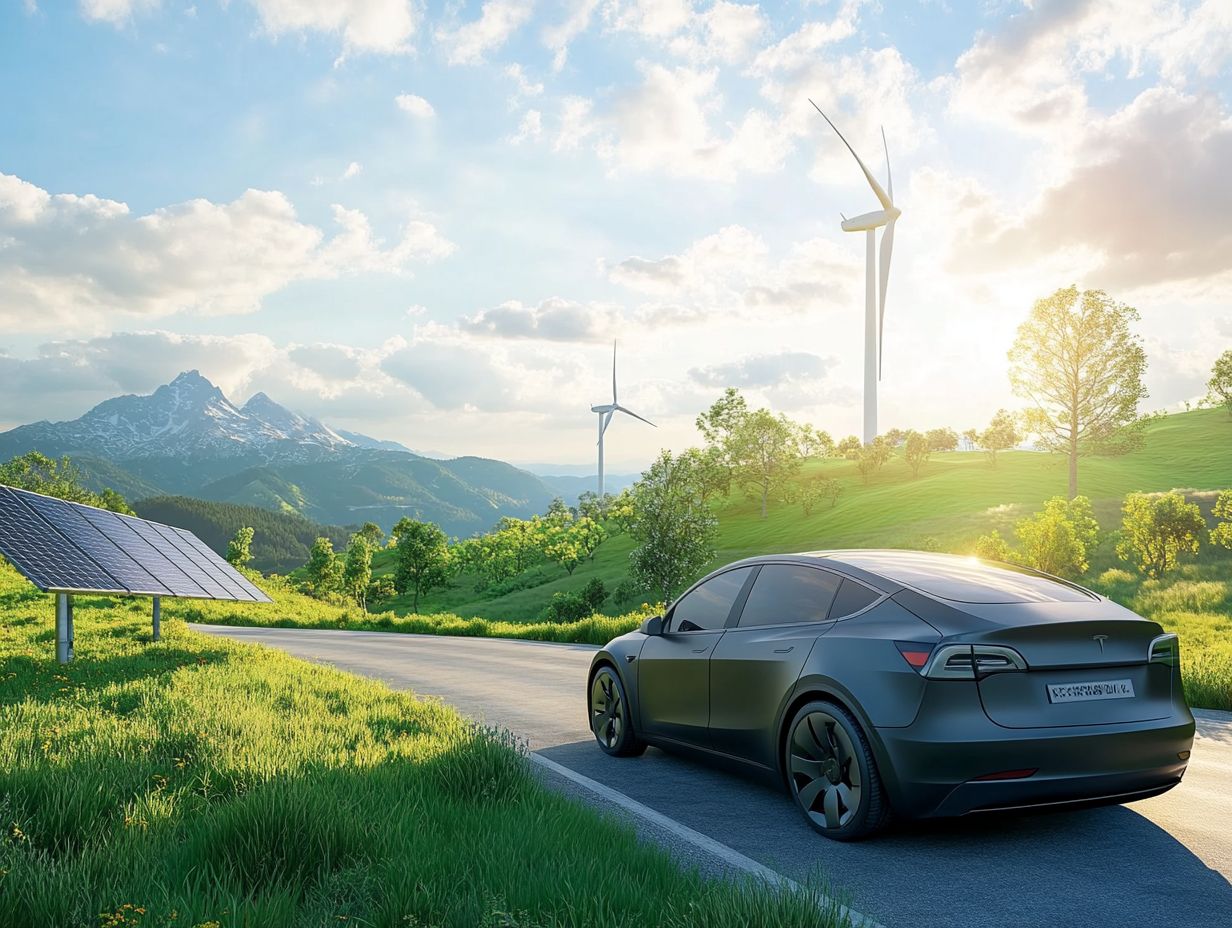
Traditional vehicles significantly impact climate change by emitting gases from their exhaust systems. These gases contribute to greenhouse gas emissions and carbon pollution, harming air quality and speeding up global warming.
According to the Environmental Protection Agency (EPA), transportation is responsible for about 29% of total greenhouse gas emissions in the United States. Conventional gasoline and diesel vehicles account for most of these emissions. In contrast, electric vehicles produce zero exhaust emissions, highlighting a stark difference.
While traditional vehicles contribute to smog and respiratory issues for millions, electric alternatives reduce emissions significantly. They help create a cleaner urban environment.
Transitioning to electric vehicles could cut greenhouse gas emissions by over 80%. This shift will help mitigate the ongoing climate crisis and improve air quality for future generations, allowing them to breathe easier and enjoy a healthier planet. Understanding the role of electric vehicles in sustainable development is crucial for this transformation.
Definition and Types
Electric vehicles (EVs) are vehicles powered entirely or partially by electricity. They use advanced battery technology and offer a cleaner alternative to traditional vehicles that depend on fossil fuels.
These innovative models come in various forms. Fully electric vehicles operate solely on battery power, while hybrid models combine conventional engines with electric propulsion. As you explore the growing EV market, you’ll see that battery technology has advanced significantly, focusing on increasing power storage and reducing charging times.
By integrating renewable energy sources, such as solar and wind, into charging systems, electric vehicle usage becomes more sustainable. This integration effectively lowers their total greenhouse gas emissions. This connection between electric mobility and green energy promotes an environmentally friendly transportation system, appealing to those who prioritize eco-conscious choices.
Benefits of Electric Vehicles
Electric vehicles (EVs) offer incredible benefits just for you! From an environmental perspective, they help you significantly reduce greenhouse gas emissions, contributing to a cleaner planet.
On the economic front, EVs improve energy efficiency and decrease operating costs. They provide a smart solution for both consumers and business owners.
Environmental and Economic Advantages
The environmental benefits of electric vehicles (EVs) are truly remarkable. By adopting EVs, you can make a significant impact on emissions reduction, especially in urban areas where air quality suffers due to traditional vehicles. Plus, you’ll gain economic rewards through lower fuel and maintenance costs.
Replacing fossil fuel-powered cars with electric vehicles drastically cuts down on harmful pollutants, leading to cleaner air and healthier communities. When powered by renewable energy sources like solar or wind, EVs greatly lower your carbon emissions.
As an owner, you’ll enjoy long-term savings since electricity is typically cheaper than gasoline. EVs also require less maintenance due to having fewer moving parts. This transition strengthens local economies by reducing energy costs and promotes a sustainable environment for future generations.
Barriers to Adoption of Electric Vehicles
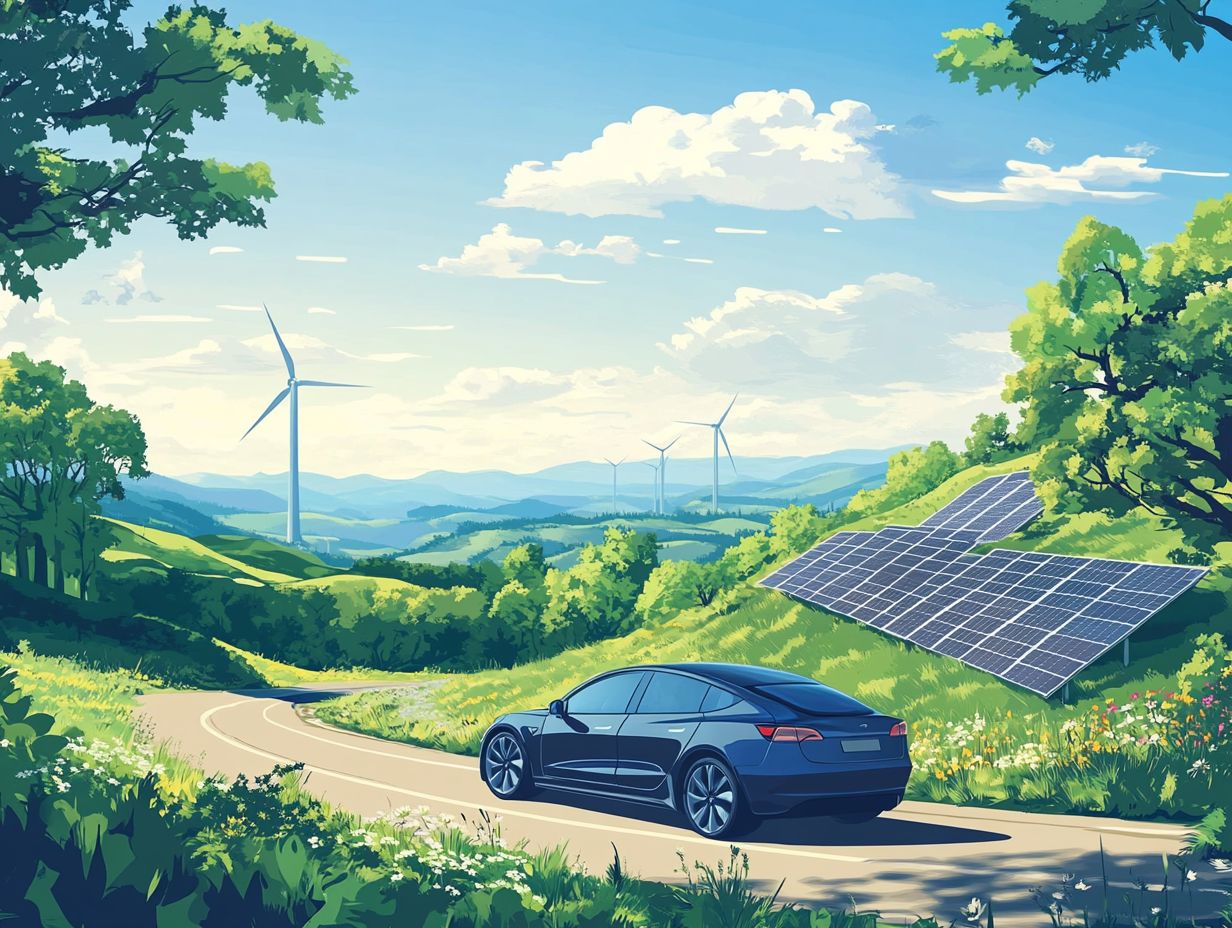
Despite the many advantages of electric vehicles (EVs), you may face several barriers to adoption. These barriers include concerns about charging options, the high costs of battery production, and the potential carbon debt linked to manufacturing emissions.
Challenges and Solutions
Addressing the challenges of electric vehicle (EV) adoption requires innovative solutions, especially in establishing effective charging strategies and expanding the necessary infrastructure.
A primary hurdle for potential EV owners is the limited network of charging stations, particularly in rural areas. While the initial costs of electric vehicles may seem daunting, the long-term savings on fuel and maintenance can outweigh that upfront investment.
To tackle these challenges, forming partnerships between governments and private organizations is crucial. These alliances can establish charging facilities that are both accessible and affordable. Additionally, subsidies and tax incentives for purchasing electric vehicles can alleviate financial burdens, encouraging more people to choose sustainable transportation and support a cleaner environment.
Government Incentives and Policies
Government incentives and policies play a crucial role in promoting the adoption of electric vehicles (EVs). They offer financial benefits and set out rules and policies aimed at reducing emissions and combating climate change.
By taking advantage of these incentives, you can contribute to this transformative movement while enjoying the benefits of embracing sustainable transportation.
Encouraging the Shift to Electric Vehicles
Encouraging a shift to electric vehicles (EVs) can be achieved through a mix of effective government incentives, public awareness campaigns, and strong investments in renewable energy infrastructure.
These strategies not only help reduce greenhouse gas emissions but also promote energy independence and stimulate economic growth. Governments at various levels are rolling out attractive tax credits and rebates to make EVs financially appealing. At the same time, organizations are launching educational initiatives to inform consumers about the benefits of transitioning to electric alternatives.
The increase in charging stations, supported by both public and private investments, improves accessibility for EV owners, boosting confidence in this transition. Concurrently, funding renewable energy projects ensures that the electricity powering these vehicles comes from sustainable sources, enhancing the green appeal of electric mobility.
Frequently Asked Questions

What are electric vehicles and how do they contribute to climate change?
Electric vehicles are powered by electricity instead of gasoline or diesel. They help combat climate change by reducing greenhouse gas emissions, highlighting their carbon offset potential, which contributes to mitigating global warming.
How do electric vehicles help reduce air pollution?
Electric vehicles produce zero emissions, meaning they do not release harmful pollutants into the air like gasoline and diesel vehicles. Transitioning to electric vehicles can significantly improve air quality.
What is the impact of electric vehicles on the environment?
Electric vehicles positively impact the environment by emitting fewer pollutants and greenhouse gases. Additionally, the role of public transportation in EV sustainability reduces reliance on fossil fuels, helping to mitigate climate change effects and protect the planet for future generations.
Are electric vehicles better for the economy?
Yes, electric vehicles can positively influence the economy. They create jobs in the manufacturing and maintenance sectors while reducing dependence on foreign oil imports. Additionally, electric vehicles can save individuals and businesses money on fuel costs and maintenance.
What are the challenges facing the widespread adoption of electric vehicles?
Despite their benefits, electric vehicles face challenges such as high upfront costs, limited charging infrastructure, and longer charging times compared to gasoline vehicles. However, technological advancements and supportive policies are gradually addressing these issues.
Ready to explore the world of electric vehicles? Discover local incentives and make the switch today!
How can individuals contribute to the transition to electric vehicles?
Individuals can help transition to electric vehicles by choosing to purchase or lease one. They can also use public transport and other alternatives.
Individuals can also make small changes. Carpooling and cutting down on unnecessary trips are effective steps. Every small step counts, and your choices can make a difference!


